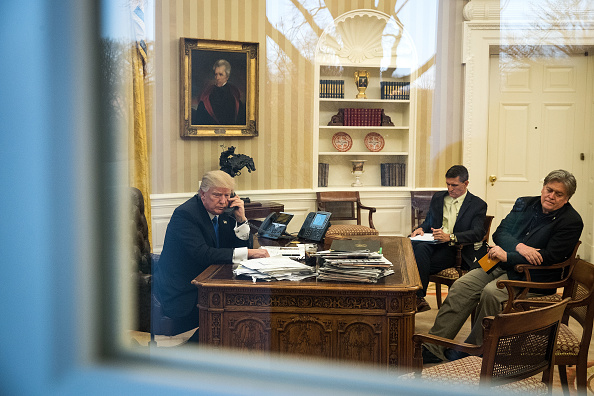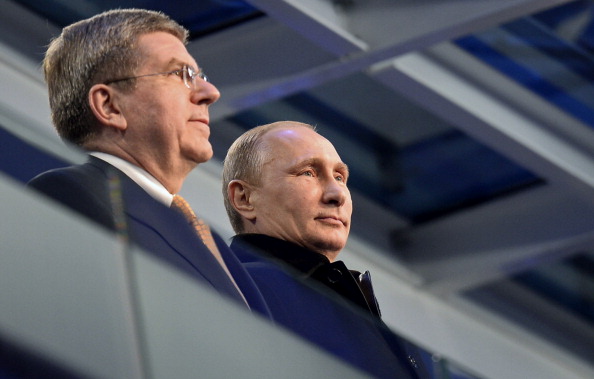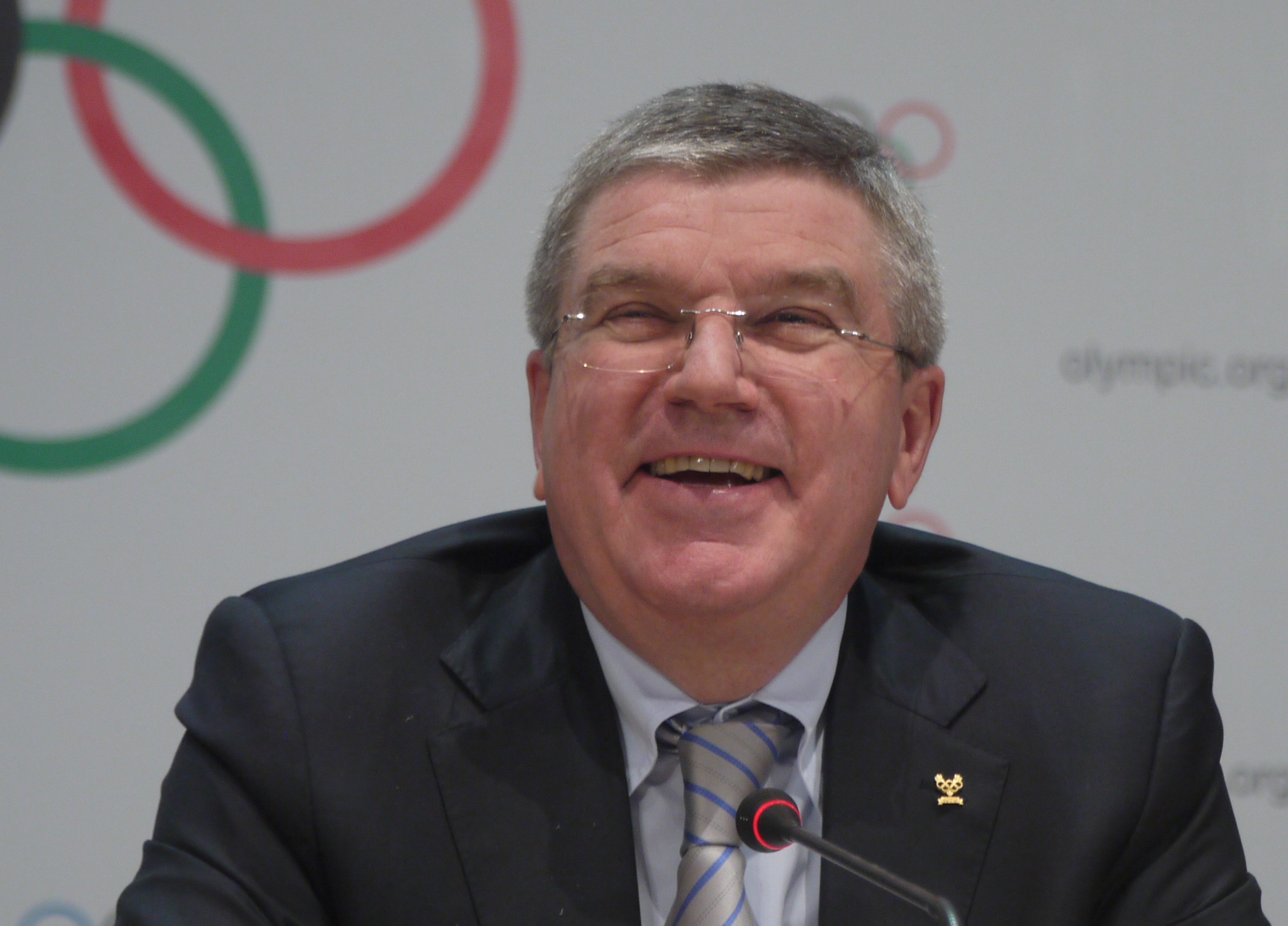Everybody: chillax.
And while you’re at it, the time has come for everybody — this means you, you and especially you — to start thinking, and hard, about why it is that there’s such an obvious, ridiculous and totally unfair double standard when it comes to evaluating American bids for events such as the Olympics and soccer’s World Cup.
In the aftermath of President Donald J. Trump’s executive order on Friday imposing travel restrictions on certain countries, you might have thought — especially reading Twitter and the mainstream media Kool-Aid — that the freaking sky was falling.
The Los Angeles 2024 Summer Games bid: imperiled if not dead.
The notion of an American bid for the 2026 soccer World Cup: wounded, maybe fatally.
These assertions betray a wild miscalculation if not a fundamental misunderstanding of what’s at issue.
Moreover: a fevered rush to judgment never serves anyone or anything.
Deep breath.
First things first: the International Olympic Committee vote on the 2024 race isn’t until September 13 in Lima, Peru. Paris and Budapest are also in the race. Eight months from now is an eternity.
To speculate now, in January, about what might happen in September because of what Mr. Trump did in January is pointless.
Let’s all remember that our French friends have their own national elections in the spring. If Marine le Pen wins, will there be similar freak-out? If François Fillon wins, will the French trade unions go berserk and the threat of trade union uprisings threaten a Paris 2024 candidacy? Look, will Mr. Fillon even stay in the race? He has said in recent days he would drop out if he were criminally investigated over allegations, much reported on in the French press, that his wife was paid for parliamentary work she did not do.
Let’s say Madame le Pen wins. Just for the hypothetical. Is that the reason to vote up or down on Paris?
Or Viktor Orban, the populist prime minister of Hungary. He has said, “We have to change and make Europe great again.” That verbiage sounds — vaguely familiar. Does that make him the devil? Is he the reason a Budapest bid ought to soar or go down in flames?
If not — why is Mr. Trump being held to a different, and entirely unfair, double standard?
Here are Mr. Trump's words from his January 20 inauguration:
"We will seek friendship and goodwill with the nations of the world -- but we do so with the understanding that it is the right of all nations to put their own interests first," and that is an unchallengeable truth.
He followed, "We do not seek to impose our way of life on anyone, but rather to let it shine as an example for everyone to follow."
Let’s put the core of this right out there: you don’t have to like Mr. Trump. It does not matter whether you, you or especially you like the new president.
Repeat, and for emphasis: it does not matter.
Here is what matters:
Many of the members of the IOC like, or are inclined to like, Mr. Trump. Especially the IOC president, Thomas Bach. He likes Mr. Trump just fine.
Whoa.
While you are processing that, this:
Mr. Trump is the duly elected president of the United States. Advice: if he’s not your cup of tea, pour yourself a shot of bourbon or vodka or, if you prefer, pop a Xanax and proceed, quickly, through the five stages of grief and get to acceptance. Like, now.
Repeat: Donald J. Trump is the president of the United States. The American people elected him.
If you think Trump is the antichrist, you have a very short memory when it comes to Barack Obama in the international sports sphere, starting with that disaster of a show in Copenhagen in 2009 on behalf of Chicago’s 2016 Olympic bid followed by the delegations to Sochi 2014 led by gay athletes including the tennis star Billie Jean King and, in short order, the overreach of American executive power in the form of the FIFA indictments and an investigation by the U.S. attorney’s office in Brooklyn of doping by Russian athletes, as if the United States would or should have any interest whatsoever in doping in Russia.
Imagine if the tables were turned and the Russian federal police and prosecutors launched a purportedly doping-related investigation there of American athletes on the grounds that, say, American high jumpers had violated Russian banking laws. That’s a laugh.
At any rate:
Do you like Vladimir Putin?
What about Xi Jinping?
Do you like the Russian system of government? What about the way they do things in China? Would you consider China, even as “open” as it is now, autocratic or not? For that matter, Russia?
Let’s have a little straw vote here: would you rather, all things considered, live in the United States, Russia or China?
The 2014 Winter Games went to Sochi, with Mr. Putin making a personal appearance before the voting members of the IOC at an assembly in Guatemala.
Beijing is the first city on Planet Earth that will play host to both the Summer Games, 2008, and the Winter Games, 2022.
So — pretty clear that being Mr. Putin or Mr. Xi is not a bid killer. Yet being Mr. Trump ought to be?
Let’s have another little vote.
Would you rather, all things considered, live in Russia, Qatar or the United States?
Soccer’s World Cup will be in Russia in 2018.
And in Qatar in 2022.
Back to the news — because the president, who campaigned on a promise to implement immigration reform, took a first step in so doing, the United States is suddenly a pariah?
That logic does not hold.
To be clear: the order suspends entry of all refugees to the United State for 120 days, bars Syrian refugees indefinitely and blocks entry into the country for 90 days for citizens of seven predominantly Muslim nations: Iran, Iraq, Libya, Somalia, Sudan, Syria and Yemen.
https://twitter.com/rncpeterkin/status/825462271971323904
This is why maybe just pausing before hitting that “send” button can sometimes be helpful, even for someone as thoughtful and well-intentioned as Mr. Peterkin, who is an IOC member from the Caribbean island of St. Lucia.
As the Washington Post reported Saturday, “Officials tried to reassure travelers and their families, pointing out that green-card holders in the United States will not be affected and noting that [homeland security officials are] allowed to grant waivers to those individuals and others deemed to not pose a security threat.”
The story adds, noting that details were for sure still being worked out and waivers would be “evaluated on a case-by-case basis,” and quoting an unnamed official, “If you’ve been living in the United States for 15 years and you own a business and your family is here, will you be granted a waiver? I’m assuming yes, but we are working that out.”
Wait — amid the tweets and corresponding rip jobs of the president of the United States, who was elected first and foremost to secure the safety and well-being of the people, and moved Friday to implement an initial, temporary strategy that he and his advisors deemed appropriate, this:
Where are the similarly heated complaints or observations about — just to pick one — France?
France has been under a “state of emergency” since the attacks in Paris in November 2015 that killed 130 people. Last month, the French parliament last month extended that state of emergency through July 2017, the interior minister warning ahead of the parliamentary vote that the country faced an “extremely high” risk of another attack.
Why not the same — or worse — outrage about a “state of emergency” now lasting almost two full years? In a western democracy?
Beyond which:
What does any of this, in theory, have to do with sport?
Answer: zero.
For those of you who would prefer to be idealists: isn’t the whole notion of the Olympics that sport can bring the world together, at least for 17 days?
“We are working closely with the administration to understand the new rules and how we best navigate them as it pertains to visiting athletes,” U.S. Olympic Committee spokesman Patrick Sandusky said Saturday. “We know they are supportive of the Olympic movement, and our bid, and believe we will have a good working relationship with them to ensure our success in hosting and attending events.”
Would you know that from reading, for instance, the New York Times?
In a story published Saturday, the Times’ Jere Longman, an excellent newsman and a longtime colleague, quotes the historian David Wallechinsky, also a longtime colleague, as saying that Mr. Trump is perceived in Olympic circles as “anti-Muslim, anti-woman and anti-Latino.”
Wallechinsky then goes on to say of the president’s executive order, “This is worse. I would consider it a blow to the Los Angeles bid — not fatal but a blow.”
Oh — as if Mr. Putin, who has waged a war in Chechnya, is considered pro-Muslim?
Or Qatar or China, just to pick two, are havens for women’s rights?
Admittedly the United States is imperfect. Any country is. But which country has maybe, just maybe, made more progress in advancing the rights of women in the workplace and other spheres — China, Russia, Qatar or the United States?
As far as the IOC goes:
Right now the United States has three IOC members. There’s Larry Probst. And then there are Anita DeFrantz and Angela Ruggiero, and she is the current chair of the athlete’s commission.
France, two members, both men: Guy Drut. Tony Estanguet.
Hungary: two men. Pal Schmitt. Daniel Gyurta.
Would it maybe have been relevant, journalistically speaking, if Longman had mentioned that Wallechinsky, who is assuredly one of the world’s foremost Olympic historians, is also a noted compiler of published lists such as “world’s worst dictators”? Maybe an informed guess how Wallechinsky views the new president?
Beyond which:
Mr. Trump and Mr. Putin had a phone call on Saturday — initiated by Mr. Putin, according to the White House. The call lasted for an hour. Mr. Trump also spoke Saturday with leaders of Australia, France, Germany and Japan.
Where was the major diplomatic blowback? Hello?
Just to name one: did the prime minister of the United Kingdom criticize Mr. Trump? Uh, no.
Sure, the president of France did. But who cares? He’s about as popular in France as an “I’m with Her” button would be a White House staff meeting, and everybody knows it.
Japanese Prime Minister Shinzo Abe agreed Saturday to meet with Mr. Trump during a visit to Washington on Feb. 10. The next Summer Games are in Tokyo, in 2020. So interesting.
Mr. Putin and Mr. Bach have — since the November election —already spoken by phone. Mr. Bach, since taking office in September 2013, has met with more than 100 heads of government of state — but did not meet with Mr. Obama. Odds are good that Mr. Trump will meet, and probably sooner than later, with Mr. Bach.
Mr. Bach is, of course, on good terms with Mr. Putin.
Mr. Bach knows full well that the Olympic movement needs the United States right now. That’s why he made a trip to California last year, to Silicon Valley. The movement needs the creativity of California to reach the youth audience that keeps the Olympics relevant and material. What is the IOC’s major initiative right now? The Olympic Channel. Who produces more influential content than anyone anywhere? California — Hollywood, Snapchat, Google, Facebook, Apple.
Mr. Bach knows, too, that with recent budget headaches — Rio, Sochi, London, Beijing — the IOC has to take a very, very considered look at a Los Angeles Games for 2024, where everything is mostly built, the city has a two-time legacy of producing big-time and inventive Games, the locals want the Olympics and absent colossal and unpredictable disaster the Games will make everyone involved, as Sean Penn’s character said in Fast Times at Ridgemont High, beaucoup dollares.
Mr. Bach knows, too, that this is LA’s time. Bid leader Casey Wasserman scared up $35 million to fund a 2024 bid. He can’t go back to those donors if the IOC turns LA down for ’24 and say, let’s try again. Won’t happen.
Beyond which:
Let’s say you’re Mr. Trump. Let’s say the IOC turns LA down the way it did Chicago for 2016 and New York for 2012.
It would state the obvious to note that the new president has shown he is plainly willing to play hardball.
Repeatedly, too, he has expressed interest in the tax scheme.
It is not hard to figure out, not difficult indeed, that if the IOC shoots down LA for 2024, there might well be an inclination at the White House to say, OK, let’s take a very hard look, right now, at the tax status of all the IOC’s American-based top-tier sponsors.
Everybody: chillax.







